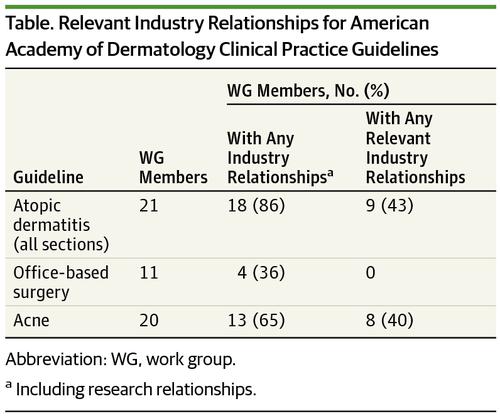JAMA Dermatology ( IF 11.5 ) Pub Date : 2018-03-01 , DOI: 10.1001/jamadermatol.2017.6207 Henry W. Lim 1 , Craig A. Elmets 1 , Wendy Smith Begolka 1

|
Professional medical societies are committed to providing trustworthy clinical practice guidelines (CPGs) that summarize evidence-based clinical practices for their members, and for the patients that they serve. In response to evolving national and medical specialty society standards, the Institute of Medicine (IOM) and the Council of Medical Specialty Societies (CMSS) have issued carefully considered, detailed recommendations about how these CPGs should be prepared and communicated to the public.1,2 It is important to note that they include recommendations regarding conflict of interest (COI). The American Academy of Dermatology (AAD), as the largest specialty society of dermatologists, takes seriously the development of dermatology CPGs, including the management of COI. In light of the recommendations from the IOM and CMSS, the AAD has revised and continues to refine its approach to directly and transparently address potential COI in CPG development and to limit the participation of those who may introduce bias into evidence-based methods.
中文翻译:

解决皮肤科临床实践指南中的潜在利益冲突
专业医学协会致力于提供可信赖的临床实践指南(CPG),概述其成员以及所服务患者的循证临床实践。为了响应不断发展的国家和医学专业协会标准,医学研究所(IOM)和医学专业协会理事会(CMSS)已发布了经过仔细考虑的详细建议,说明应如何准备和向公众传达这些CPG。1 ,2重要的是要注意,其中包括有关利益冲突(COI)的建议。作为最大的皮肤科医生专业学会,美国皮肤病学会(AAD)认真对待皮肤病CPG的开发,包括COI的管理。根据IOM和CMSS的建议,AAD进行了修订并继续完善其方法,以直接,透明地解决CPG开发中的潜在COI,并限制可能在基于证据的方法中引入偏见的人员的参与。






























 京公网安备 11010802027423号
京公网安备 11010802027423号